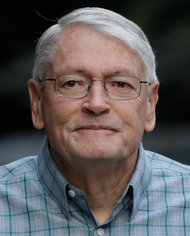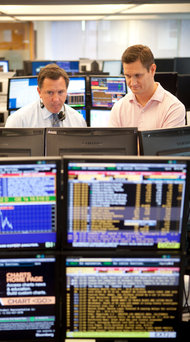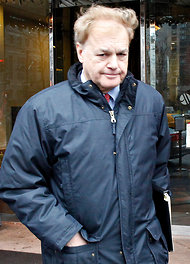News Corporation’s new publishing company will receive a $2.6 billion infusion of cash and have no debt when it separates from the company’s higher-growth cable channels and Hollywood studio this summer.
In a filing with the Securities and Exchange Commission on Friday, the company confirmed what analysts had expected: Rupert Murdoch will make sure his beloved trove of roughly 175 newspapers will have plenty of capital once they are split off on their own.
The $2.6 billion figure, $1.82 billion of which will come from the parent company, is slightly higher than investors had anticipated, leading to speculation that it might be used to acquire additional newspapers.
The Tribune Company, which emerged from bankruptcy late last year, is looking for a potential buyer for its eight newspapers, including The Los Angeles Times, which Mr. Murdoch has long coveted, according to several people with knowledge of his thinking who could not discuss the News Corporation chairman publicly. (Tribune may also decide to sell its papers as a bundle.)
The new publishing company, which will retain the name News Corporation, will include strong newspapers, like The Wall Street Journal, and weaker ones like The New York Post, that will no longer have the security of billions in revenue from Fox News, FX and movies like “Avatar.”
In an interview last summer when News Corporation confirmed the split, Mr. Murdoch said his newsroom employees “shouldn’t feel like they’ve got a crutch” in the entertainment assets.
In the six months that ended Dec. 31, the assets that make up the new publishing company had $1.31 billion in profit and revenue of $4.45 billion. Robert Thomson, who will serve as the company’s chief executive, will earn a base salary of $2 million and a performance-based annual bonus of around $2 million beginning in 2014.
The company warned investors in Friday’s filing about potential pitfalls to investing in the new News Corporation, including investigations and lawsuits related to a phone hacking scandal that erupted at The News of the World tabloid in Britain in 2011. Legal fees and other expenses related to the scandal cost News Corporation $250 million from July 1, 2010, through Dec. 31, 2012, plus $25 million paid to claimants to settle civil lawsuits, the company said.
The Wall Street Journal will introduce WSJ.Money, a glossy magazine devoted to wealth management and personal finance, on Saturday. The magazine arrives after The Journal’s publisher, Dow Jones Company, ceased putting out a printed edition of Smart Money. The move underscores the new News Corporation’s emphasis on the Journal brand, and its bullishness on print.
“While others have scaled back in print, we’ve continued to buck the trend,” Gerard Baker, managing editor of The Journal, said in a statement.
News Corporation’s announcement comes two days after one of its competitors, Time Warner, said it would spin off Time Inc., its publishing arm. Analysts expect Time Inc. to have a less favorable financial structure.
“In no way does this mean that Time Warner must follow the same blueprint,” Dave Novosel, a senior investment grade analyst at the research firm Gimme Credit, wrote Friday in a report.




